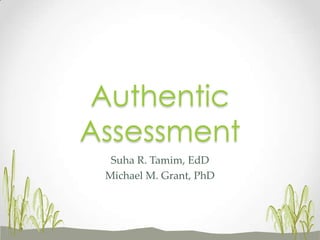The document discusses authentic assessment as a process for gathering information to understand student knowledge and skills through real-world tasks and collaboration. It emphasizes formative and summative evaluation methods, highlighting characteristics such as problem-solving skills, higher-order thinking, and the integration of assessment with learning activities. Additionally, it includes references and various assessment tools like rubrics and portfolios to aid in the evaluation process.







































